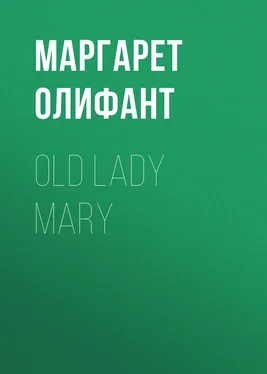Маргарет Олифант - Old Lady Mary
Здесь есть возможность читать онлайн «Маргарет Олифант - Old Lady Mary» — ознакомительный отрывок электронной книги совершенно бесплатно, а после прочтения отрывка купить полную версию. В некоторых случаях можно слушать аудио, скачать через торрент в формате fb2 и присутствует краткое содержание. Жанр: foreign_prose, literature_19, foreign_antique, на английском языке. Описание произведения, (предисловие) а так же отзывы посетителей доступны на портале библиотеки ЛибКат.
- Название:Old Lady Mary
- Автор:
- Жанр:
- Год:неизвестен
- ISBN:нет данных
- Рейтинг книги:5 / 5. Голосов: 1
-
Избранное:Добавить в избранное
- Отзывы:
-
Ваша оценка:
- 100
- 1
- 2
- 3
- 4
- 5
Old Lady Mary: краткое содержание, описание и аннотация
Предлагаем к чтению аннотацию, описание, краткое содержание или предисловие (зависит от того, что написал сам автор книги «Old Lady Mary»). Если вы не нашли необходимую информацию о книге — напишите в комментариях, мы постараемся отыскать её.
Old Lady Mary — читать онлайн ознакомительный отрывок
Ниже представлен текст книги, разбитый по страницам. Система сохранения места последней прочитанной страницы, позволяет с удобством читать онлайн бесплатно книгу «Old Lady Mary», без необходимости каждый раз заново искать на чём Вы остановились. Поставьте закладку, и сможете в любой момент перейти на страницу, на которой закончили чтение.
Интервал:
Закладка:
Mrs. Oliphant
Old Lady Mary: A Story of the Seen and the Unseen
I
She was very old, and therefore it was very hard for her to make up her mind to die. I am aware that this is not at all the general view, but that it is believed, as old age must be near death, that it prepares the soul for that inevitable event. It is not so, however, in many cases. In youth we are still so near the unseen out of which we came, that death is rather pathetic than tragic,—a thing that touches all hearts, but to which, in many cases, the young hero accommodates himself sweetly and courageously. And amid the storms and burdens of middle life there are many times when we would fain push open the door that stands ajar, and behind which there is ease for all our pains, or at least rest, if nothing more. But age, which has gone through both these phases, is apt, out of long custom and habit, to regard the matter from a different view. All things that are violent have passed out of its life,—no more strong emotions, such as rend the heart; no great labors, bringing after them the weariness which is unto death; but the calm of an existence which is enough for its needs, which affords the moderate amount of comfort and pleasure for which its being is now adapted, and of which there seems no reason that there should ever be any end. To passion, to joy, to anguish, an end must come; but mere gentle living, determined by a framework of gentle rules and habits—why should that ever be ended? When a soul has got to this retirement and is content in it, it becomes very hard to die; hard to accept the necessity of dying, and to accustom one's self to the idea, and still harder to consent to carry it out.
The woman who is the subject of the following narrative was in this position. She had lived through almost everything that is to be found in life. She had been beautiful in her youth, and had enjoyed all the triumphs of beauty; had been intoxicated with flattery, and triumphant in conquest, and mad with jealousy and the bitterness of defeat when it became evident that her day was over. She had never been a bad woman, or false, or unkind; but she had thrown herself with all her heart into those different stages of being, and had suffered as much as she enjoyed, according to the unfailing usage of life. Many a day during these storms and victories, when things went against her, when delights did not satisfy her, she had thrown out a cry into the wide air of the universe and wished to die. And then she had come to the higher table-land of life, and had borne all the spites of fortune,—had been poor and rich, and happy and sorrowful; had lost and won a hundred times over; had sat at feasts, and kneeled by deathbeds, and followed her best-beloved to the grave, often, often crying out to God above to liberate her, to make an end of her anguish, for that her strength was exhausted and she could bear no more. But she had borne it and lived through all; and now had arrived at a time when all strong sensations are over, when the soul is no longer either triumphant or miserable, and when life itself, and comfort and ease, and the warmth of the sun, and of the fireside, and the mild beauty of home were enough for her, and she required no more. That is, she required very little more, a useful routine of hours and rules, a play of reflected emotion, a pleasant exercise of faculty, making her feel herself still capable of the best things in life—of interest in her fellow-creatures, kindness to them, and a little gentle intellectual occupation, with books and men around. She had not forgotten anything in her life,—not the excitements and delights of her beauty, nor love, nor grief, nor the higher levels she had touched in her day. She did not forget the dark day when her first-born was laid in the grave, nor that triumphant and brilliant climax of her life when every one pointed to her as the mother of a hero. All these things were like pictures hung in the secret chambers of her mind, to which she could go back in silent moments, in the twilight seated by the fire, or in the balmy afternoon, when languor and sweet thoughts are over the world. Sometimes at such moments there would be heard from her a faint sob, called forth, it was quite as likely, by the recollection of the triumph as by that of the deathbed. With these pictures to go back upon at her will she was never dull, but saw herself moving through the various scenes of her life with a continual sympathy, feeling for herself in all her troubles,—sometimes approving, sometimes judging that woman who had been so pretty, so happy, so miserable, and had gone through everything that life can go through. How much that is, looking back upon it!—passages so hard that the wonder was how she could survive them; pangs so terrible that the heart would seem at its last gasp, but yet would revive and go on.
Besides these, however, she had many mild pleasures. She had a pretty house full of things which formed a graceful entourage suitable, as she felt, for such a woman as she was, and in which she took pleasure for their own beauty,—soft chairs and couches, a fireplace and lights which were the perfection of tempered warmth and illumination. She had a carriage, very comfortable and easy, in which, when the weather was suitable, she went out; and a pretty garden and lawns, in which, when she preferred staying at home, she could have her little walk, or sit out under the trees. She had books in plenty, and all the newspapers, and everything that was needful to keep her within the reflection of the busy life which she no longer cared to encounter in her own person. The post rarely brought her painful letters; for all those impassioned interests which bring pain had died out, and the sorrows of others, when they were communicated to her, gave her a luxurious sense of sympathy, yet exemption. She was sorry for them; but such catastrophes could touch her no more: and often she had pleasant letters, which afforded her something to talk and think about, and discuss as if it concerned her,—and yet did not concern her,—business which could not hurt her if it failed, which would please her if it succeeded. Her letters, her papers, her books, each coming at its appointed hour, were all instruments of pleasure. She came down-stairs at a certain hour, which she kept to as if it had been of the utmost importance, although it was of no importance at all: she took just so much good wine, so many cups of tea. Her repasts were as regular as clockwork—never too late, never too early. Her whole life went on velvet, rolling smoothly along, without jar or interruption, blameless, pleasant, kind. People talked of her old age as a model of old age, with no bitterness or sourness in it. And, indeed, why should she have been sour or bitter? It suited her far better to be kind. She was in reality kind to everybody, liking to see pleasant faces about her. The poor had no reason to complain of her; her servants were very comfortable; and the one person in her house who was nearer to her own level, who was her companion and most important minister, was very comfortable too. This was a young woman about twenty, a very distant relation, with "no claim," everybody said, upon her kind mistress and friend,—the daughter of a distant cousin. How very few think anything at all of such a tie! but Lady Mary had taken her young namesake when she was a child, and she had grown up as it were at her godmother's footstool, in the conviction that the measured existence of the old was the rule of life, and that her own trifling personality counted for nothing, or next to nothing, in its steady progress. Her name was Mary too—always called "little Mary" as having once been little, and not yet very much in the matter of size. She was one of the pleasantest things to look at of all the pretty things in Lady Mary's rooms, and she had the most sheltered, peaceful, and pleasant life that could be conceived.
Читать дальшеИнтервал:
Закладка:
Похожие книги на «Old Lady Mary»
Представляем Вашему вниманию похожие книги на «Old Lady Mary» списком для выбора. Мы отобрали схожую по названию и смыслу литературу в надежде предоставить читателям больше вариантов отыскать новые, интересные, ещё непрочитанные произведения.
Обсуждение, отзывы о книге «Old Lady Mary» и просто собственные мнения читателей. Оставьте ваши комментарии, напишите, что Вы думаете о произведении, его смысле или главных героях. Укажите что конкретно понравилось, а что нет, и почему Вы так считаете.












